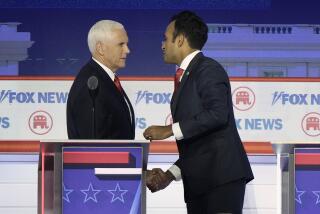McVeigh: An All-American Monster
- Share via
In 1992, a decorated Gulf War veteran sent a long list of social grievances to his hometown newspaper: “Criminals have no fear of punishment . . . Politicians’ . . . yearly salaries are more than an average person will see in a lifetime . . . The ‘American Dream’ of the middle class has all but disappeared, substituted with people struggling just to buy next week’s groceries.” He endorsed “government-sponsored health care” while asking, “Should only the rich be allowed to live long?”
So acute a sense of class injustice might have led Timothy McVeigh into the Perot campaign or perhaps into the labor movement to which his father, a longtime auto worker, belonged. But neither of these vehicles could offer a quick or dramatic solution. So the ex-GI was attracted to a wilder sphere of the discontented. And now he will pay for the ghastly choice he made.
But McVeigh’s conviction should not deter a probe into the deep source of his hatred. Whatever his psychic demons, this self-described “patriot” sincerely believed he was striking a blow for ordinary white Americans like himself abandoned by a political system that once served their needs.
His cultural reaction and defense of common toil echoes sentiments that fueled Patrick Buchanan’s 1996 campaign. And it often animates the more zealous white opponents of affirmative action and sex education. Such people are, of course, not responsible for McVeigh’s horrific actions. But their reactionary populism does echo that heard on the violent right.
This is a revolt, however fragmented and inchoate, against two major shifts that disrupted the lives of many white men over the past quarter-century. First, the social movements of the ‘60s and ‘70s--particularly black freedom, feminism and gay liberation--installed a new ethic of sexual candor and egalitarian rigor. Second, the erosion of heavy industry and the emergence of an information based economy eliminated millions of secure, union jobs.
A good many Americans applaud and have benefited from these changes; others have managed to adapt to them or suffer silently. But millions feel that they are no longer rewarded for leading a God-fearing, hard-working existence. Politicians from both parties occasionally pay lip service to their grievances while enacting policies that favor the already successful. The profoundly alienated do not, after all, decide American elections. Is it any wonder, in a culture that has always embraced violence for a good cause, that an army veteran took out his rage on a huge federal building, symbol in concrete and glass of the establishment he felt had betrayed him?
In one sense, that of politics, we are fortunate. The radical right in Europe dwarfs its American counterpart. In the first round of the recent French election, the National Front drew 15% of the vote with a call to defend hard-pressed, native-born workers and to send immigrant competitors back where they came from. Neo-fascist parties with similar platforms hold scores of parliamentary seats in Italy and Austria. A growing number of voters across the Atlantic are turning against centrist regimes that are shrinking the once-generous welfare state and failing to provide work for the unemployed.
No National Front, American-style, looms in our near future. But neither does a mass movement that might explain the sense of loss--cultural as well as economic--that afflicts many white people of modest means without demonizing Americans of other races and national backgrounds. McVeigh acted like a monster, but everything he believed was not monstrous. Only when leaders and citizens act to realize the American Dream--opportunity for anyone who works hard and honestly--will the threat of the violent right be reduced to a dim, if unpleasant, memory.
More to Read
Get the L.A. Times Politics newsletter
Deeply reported insights into legislation, politics and policy from Sacramento, Washington and beyond. In your inbox twice per week.
You may occasionally receive promotional content from the Los Angeles Times.










